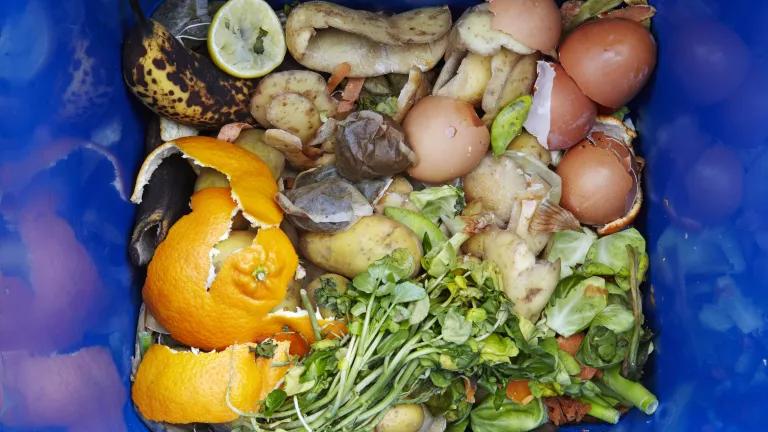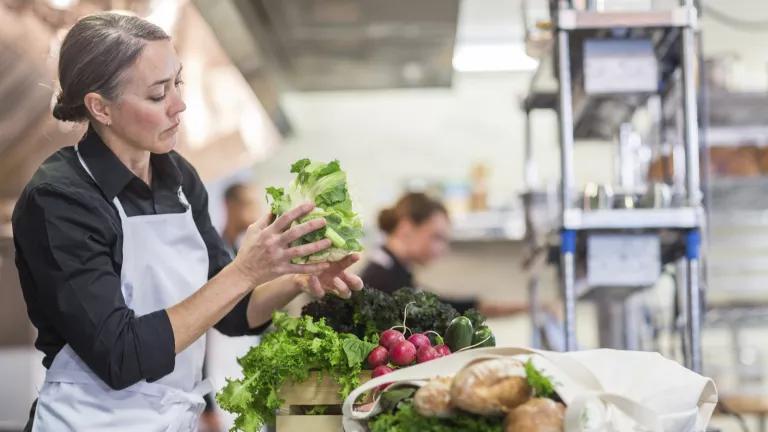Food Policy and The Bachelor: What Reality TV Tells Us about Inequality in American Agriculture

The premise of The Bachelor is simple: dozens of women compete to win the heart of--and an engagement ring from-- a single bachelor. This year's show ended Monday night when bachelor Chris Soules, a farmer from Arlington, Iowa, proposed to Whitney Bischoff, a nurse from Chicago.
One of the dramatic themes running throughout this season has been whether or not the woman Chris picks will be able to live in his hometown, which is seemingly abandoned and by all accounts, depressingly boring. Arlington, we learn, is his "greatest insecurity." And in the end it does play a decisive role: out of the two-remaining women in the final episode, only Whitney agrees to move to Arlington, giving Chris all the encouragement he needs to propose.
In an earlier episode, the remaining women visit Arlington and are shocked to find it so devoid of life. The town's restaurants and bars are all permanently closed and only a couple of tiny businesses seem to remain. Even the local pastor seemed to have given up on it. When asked what people do in Arlington, he responds, "We go somewhere else."

Arlington, Iowa
While showing one of his potential wives around town, Chris tries to explain its ghost town-like atmosphere by telling her that there aren't a lot of jobs available because "technology's kind of replaced people."
It's true that mechanization has played an important role in the depopulation of places like Arlington.
But that's not the deciding factor.
What separates countries with healthy rural communities and countries like ours--countries whose rural areas are becoming increasingly abandoned and impoverished--is not technology, but government policy.
Unlike governments in Europe and Japan, which support small farmers through a variety of strategies, U.S. food policy puts small and medium-sized farmers at a massive disadvantage. Since the first farm bill in 1933, the United States has given large farmers like Chris more money through loans and subsidies, and perhaps just as importantly, implemented a vast set of laws and regulations that have pushed most farmers out of regional food systems.
That's why the average full-time farmer in the United States has about five times as much land as the average full-time farmer in Germany.[1] It's also why we've seen a massive increase in inequality among farmers in the United States.
As this 2013 USDA report on farm size documents, the number of both very large and very small farms has increased over the past three decades, while the number of medium-sized farms has fallen sharply. In other words, the middle class farmer is in deep trouble.

Chris discussing agricultural economics with potential wife Jade Roper
Chris is typical of the farmers that now own the bulk of our country's farmland: he's white, male, well educated, and wealthy. Soules and his family own over 5,500 acres of farmland, which are collectively worth about $35 million.[2] In a rare moment of candor about his wealth he says, "I'm passionate about land...I like owning it." In addition to laying claim to a sizeable chunk of some of America's most expensive agricultural land, he's also received hundreds of thousands of dollars in subsidies from the federal government.
Since the 1960s, a large body of economic research has developed showing that economic growth resulting from agriculture is much more effective at reducing poverty than other forms of growth. There's a catch though: large farms barely reduce poverty, if at all. As the World Bank puts it, "GDP growth originating in agriculture is, on average, at least twice as effective in benefiting the poorest half of a country's population." However, these benefits are not evident when agricultural growth is concentrated in "large capital-intensive farms."
Much of this research focuses on the developing world, but there's a lot of evidence that this same relationship between farm size and rural poverty holds true in the United States too. Eight decades of research has demonstrated that large-scale industrial farming in the United States deeply damages the social fabric of communities and adversely impacts socioeconomic conditions.

Chris' fiancée, Whitney, pondering life in Arlington
It's easy to see how inequality could make Arlington such a boring place. If the Soules family farm were sold and split into farms that equaled the average size of farms owned by full-time farmers in Germany, there'd be 40 middle-class families living on that land instead of just one wealthy one. Large farmers like the Soules do hire farm labor, but most workers on large-scale farms are migrants that don't make enough money to shop at local businesses or participate in the local community.
There are over 200 farms larger than 500 acres in Fayette County, where Arlington's located. These megafarms make up only 18% of the county's total according to the 2012 Agricultural Census, yet together they comprise 60% of the county's farmland.
If you sold and divided these megafarms into German-sized farms, you would dramatically increase the town's population. There would be hundreds, if not thousands, of more people that could afford to shop at local businesses, take part in community events, and crucially for Chris, date each other. All this increased economic and social activity would create more off-farm jobs, creating even more economic and social activity in a virtuous cycle.
Arlington's never going to be New York - or even Dubuque - but it would be a more equitable place if American food policy supported small and medium-sized farmers. It would also be a much more appealing place to live.
[1] Data compiled in 2010 by the German Federal Ministry of Food, Agriculture, and Consumer Protection show that the average farm operated by full-time farmers in Germany is 56.6 hectares or approximately 140 acres, while the 2012 USDA Census of Agriculture found that the average farm operated by a full-time farmer in the United States is 674 acres.
[2] According to the 2012 Census of Agriculture, the average acre of farmland in Fayette County, where they live, is worth $6,879. This amount also includes the value of buildings located on farmland.



